BMG209: Introduction to Management and Leadership: Effective Manager
VerifiedAdded on 2021/11/16
|11
|3118
|44
Essay
AI Summary
This essay, written for BMG209: Introduction to Management and Leadership, investigates the characteristics of an effective manager. It begins with an introduction to the concept of management and its evolution, referencing key theorists such as Fayol, Taylor, and Weber, along with their respective theories. The essay then delves into the work of Mintzberg and Whetten and Cameron, highlighting the importance of interpersonal skills, communication, and adaptability in modern management. The methodology section details interviews with two managers from different industries, offering diverse perspectives on managerial roles and challenges. The analysis and discussion section compares interview findings with established theories, examining daily tasks, critical problems, essential skills, and the factors contributing to managerial success. The essay concludes by summarizing the key findings, emphasizing the importance of skills like communication, problem-solving, and adaptability in achieving effective management. This work is a valuable resource for students seeking to understand the complexities of management and leadership.

Paraphrase This Document
Need a fresh take? Get an instant paraphrase of this document with our AI Paraphraser
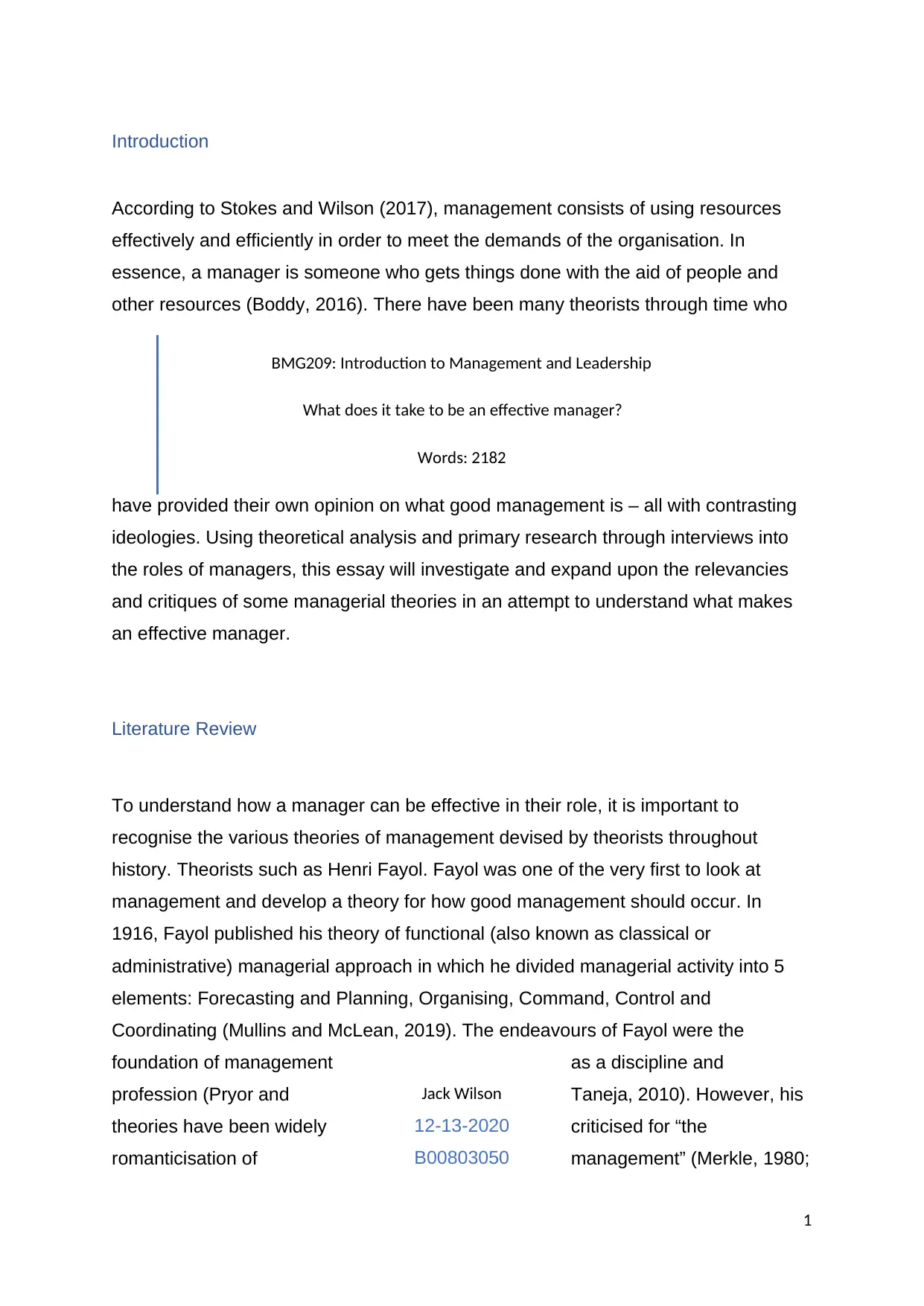
Introduction
According to Stokes and Wilson (2017), management consists of using resources
effectively and efficiently in order to meet the demands of the organisation. In
essence, a manager is someone who gets things done with the aid of people and
other resources (Boddy, 2016). There have been many theorists through time who
have provided their own opinion on what good management is – all with contrasting
ideologies. Using theoretical analysis and primary research through interviews into
the roles of managers, this essay will investigate and expand upon the relevancies
and critiques of some managerial theories in an attempt to understand what makes
an effective manager.
Literature Review
To understand how a manager can be effective in their role, it is important to
recognise the various theories of management devised by theorists throughout
history. Theorists such as Henri Fayol. Fayol was one of the very first to look at
management and develop a theory for how good management should occur. In
1916, Fayol published his theory of functional (also known as classical or
administrative) managerial approach in which he divided managerial activity into 5
elements: Forecasting and Planning, Organising, Command, Control and
Coordinating (Mullins and McLean, 2019). The endeavours of Fayol were the
foundation of management as a discipline and
profession (Pryor and Taneja, 2010). However, his
theories have been widely criticised for “the
romanticisation of management” (Merkle, 1980;
1
BMG209: Introduction to Management and Leadership
What does it take to be an effective manager?
Words: 2182
Jack Wilson
12-13-2020
B00803050
According to Stokes and Wilson (2017), management consists of using resources
effectively and efficiently in order to meet the demands of the organisation. In
essence, a manager is someone who gets things done with the aid of people and
other resources (Boddy, 2016). There have been many theorists through time who
have provided their own opinion on what good management is – all with contrasting
ideologies. Using theoretical analysis and primary research through interviews into
the roles of managers, this essay will investigate and expand upon the relevancies
and critiques of some managerial theories in an attempt to understand what makes
an effective manager.
Literature Review
To understand how a manager can be effective in their role, it is important to
recognise the various theories of management devised by theorists throughout
history. Theorists such as Henri Fayol. Fayol was one of the very first to look at
management and develop a theory for how good management should occur. In
1916, Fayol published his theory of functional (also known as classical or
administrative) managerial approach in which he divided managerial activity into 5
elements: Forecasting and Planning, Organising, Command, Control and
Coordinating (Mullins and McLean, 2019). The endeavours of Fayol were the
foundation of management as a discipline and
profession (Pryor and Taneja, 2010). However, his
theories have been widely criticised for “the
romanticisation of management” (Merkle, 1980;
1
BMG209: Introduction to Management and Leadership
What does it take to be an effective manager?
Words: 2182
Jack Wilson
12-13-2020
B00803050
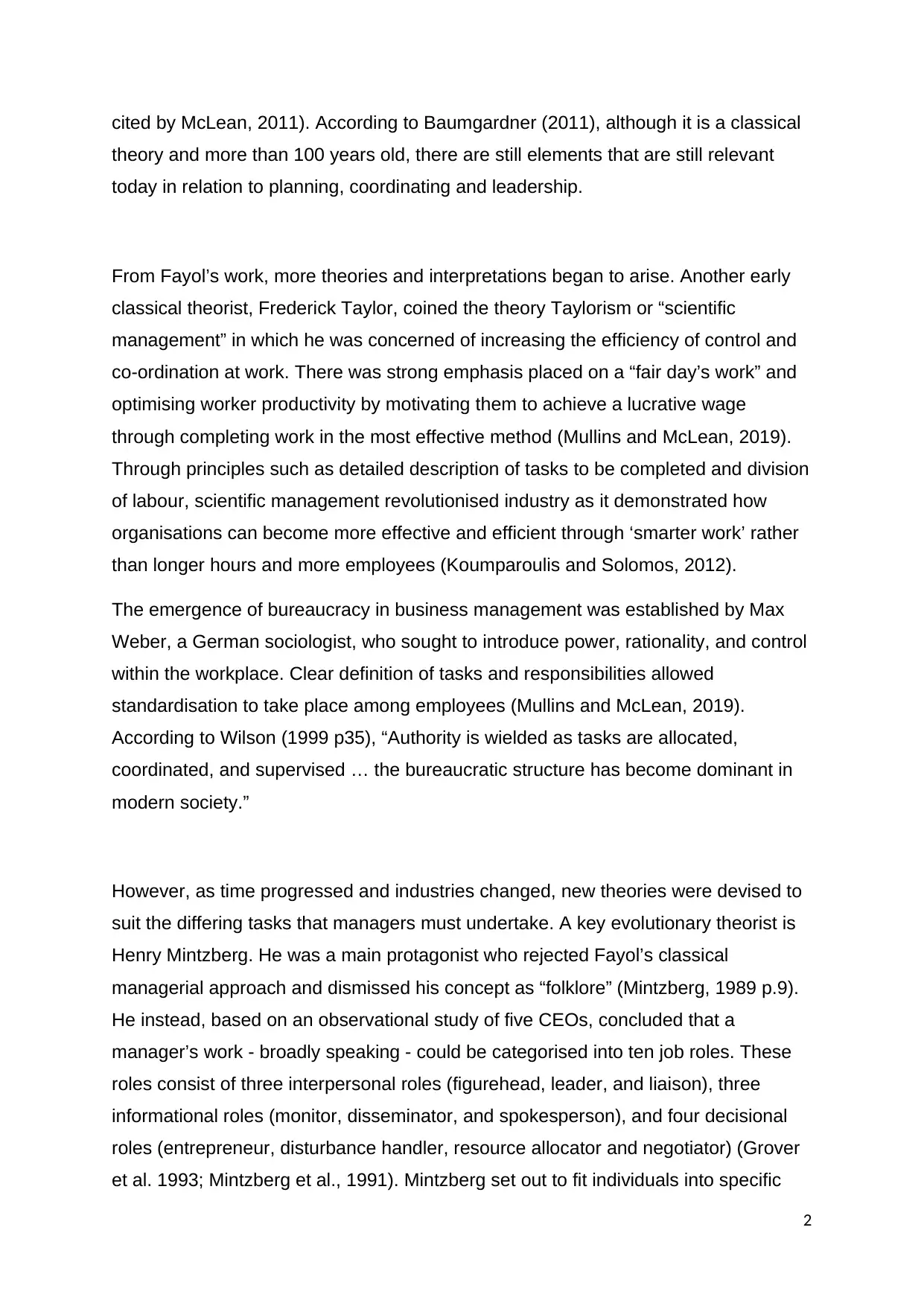
cited by McLean, 2011). According to Baumgardner (2011), although it is a classical
theory and more than 100 years old, there are still elements that are still relevant
today in relation to planning, coordinating and leadership.
From Fayol’s work, more theories and interpretations began to arise. Another early
classical theorist, Frederick Taylor, coined the theory Taylorism or “scientific
management” in which he was concerned of increasing the efficiency of control and
co-ordination at work. There was strong emphasis placed on a “fair day’s work” and
optimising worker productivity by motivating them to achieve a lucrative wage
through completing work in the most effective method (Mullins and McLean, 2019).
Through principles such as detailed description of tasks to be completed and division
of labour, scientific management revolutionised industry as it demonstrated how
organisations can become more effective and efficient through ‘smarter work’ rather
than longer hours and more employees (Koumparoulis and Solomos, 2012).
The emergence of bureaucracy in business management was established by Max
Weber, a German sociologist, who sought to introduce power, rationality, and control
within the workplace. Clear definition of tasks and responsibilities allowed
standardisation to take place among employees (Mullins and McLean, 2019).
According to Wilson (1999 p35), “Authority is wielded as tasks are allocated,
coordinated, and supervised … the bureaucratic structure has become dominant in
modern society.”
However, as time progressed and industries changed, new theories were devised to
suit the differing tasks that managers must undertake. A key evolutionary theorist is
Henry Mintzberg. He was a main protagonist who rejected Fayol’s classical
managerial approach and dismissed his concept as “folklore” (Mintzberg, 1989 p.9).
He instead, based on an observational study of five CEOs, concluded that a
manager’s work - broadly speaking - could be categorised into ten job roles. These
roles consist of three interpersonal roles (figurehead, leader, and liaison), three
informational roles (monitor, disseminator, and spokesperson), and four decisional
roles (entrepreneur, disturbance handler, resource allocator and negotiator) (Grover
et al. 1993; Mintzberg et al., 1991). Mintzberg set out to fit individuals into specific
2
theory and more than 100 years old, there are still elements that are still relevant
today in relation to planning, coordinating and leadership.
From Fayol’s work, more theories and interpretations began to arise. Another early
classical theorist, Frederick Taylor, coined the theory Taylorism or “scientific
management” in which he was concerned of increasing the efficiency of control and
co-ordination at work. There was strong emphasis placed on a “fair day’s work” and
optimising worker productivity by motivating them to achieve a lucrative wage
through completing work in the most effective method (Mullins and McLean, 2019).
Through principles such as detailed description of tasks to be completed and division
of labour, scientific management revolutionised industry as it demonstrated how
organisations can become more effective and efficient through ‘smarter work’ rather
than longer hours and more employees (Koumparoulis and Solomos, 2012).
The emergence of bureaucracy in business management was established by Max
Weber, a German sociologist, who sought to introduce power, rationality, and control
within the workplace. Clear definition of tasks and responsibilities allowed
standardisation to take place among employees (Mullins and McLean, 2019).
According to Wilson (1999 p35), “Authority is wielded as tasks are allocated,
coordinated, and supervised … the bureaucratic structure has become dominant in
modern society.”
However, as time progressed and industries changed, new theories were devised to
suit the differing tasks that managers must undertake. A key evolutionary theorist is
Henry Mintzberg. He was a main protagonist who rejected Fayol’s classical
managerial approach and dismissed his concept as “folklore” (Mintzberg, 1989 p.9).
He instead, based on an observational study of five CEOs, concluded that a
manager’s work - broadly speaking - could be categorised into ten job roles. These
roles consist of three interpersonal roles (figurehead, leader, and liaison), three
informational roles (monitor, disseminator, and spokesperson), and four decisional
roles (entrepreneur, disturbance handler, resource allocator and negotiator) (Grover
et al. 1993; Mintzberg et al., 1991). Mintzberg set out to fit individuals into specific
2
⊘ This is a preview!⊘
Do you want full access?
Subscribe today to unlock all pages.

Trusted by 1+ million students worldwide
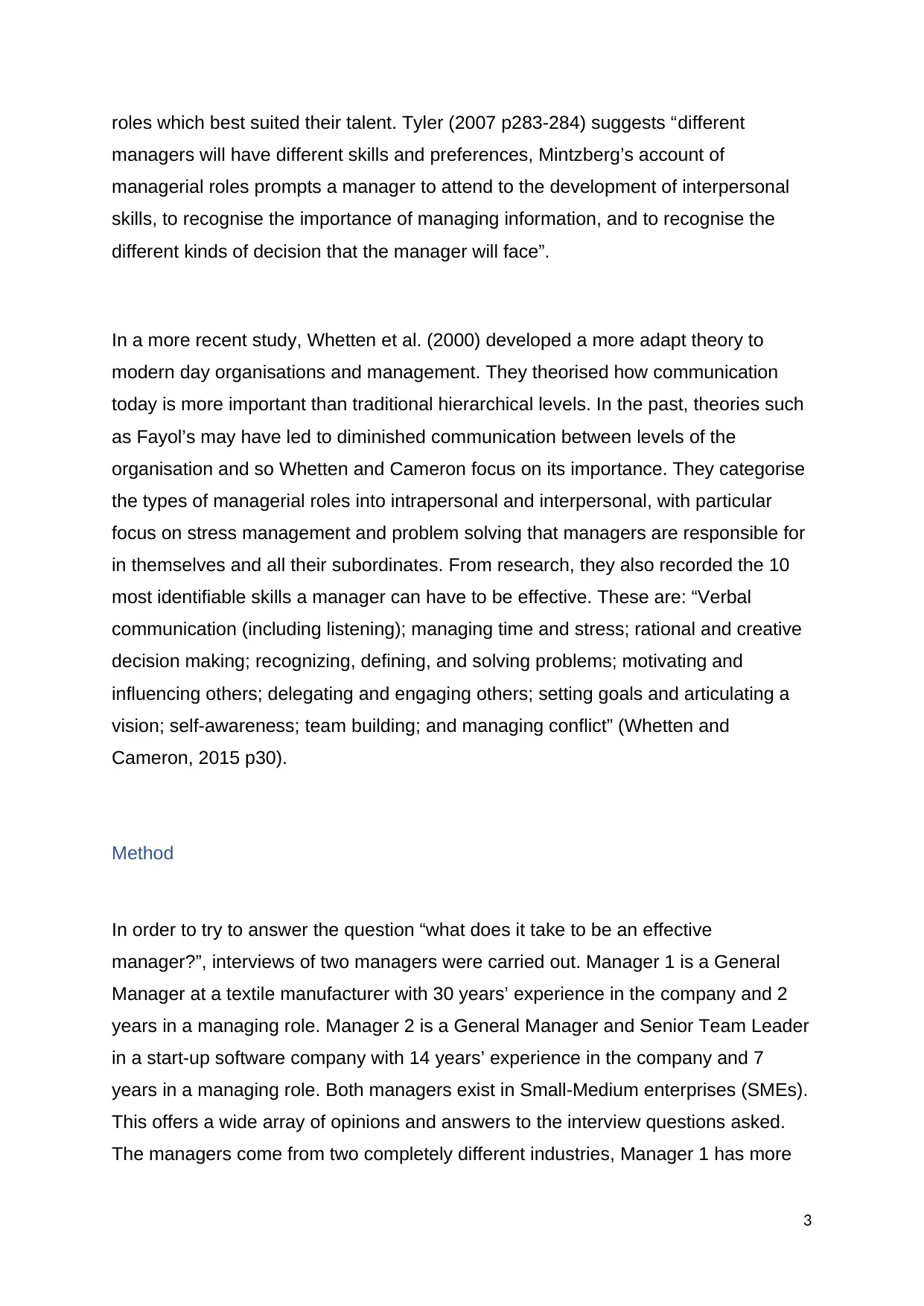
roles which best suited their talent. Tyler (2007 p283-284) suggests “different
managers will have different skills and preferences, Mintzberg’s account of
managerial roles prompts a manager to attend to the development of interpersonal
skills, to recognise the importance of managing information, and to recognise the
different kinds of decision that the manager will face”.
In a more recent study, Whetten et al. (2000) developed a more adapt theory to
modern day organisations and management. They theorised how communication
today is more important than traditional hierarchical levels. In the past, theories such
as Fayol’s may have led to diminished communication between levels of the
organisation and so Whetten and Cameron focus on its importance. They categorise
the types of managerial roles into intrapersonal and interpersonal, with particular
focus on stress management and problem solving that managers are responsible for
in themselves and all their subordinates. From research, they also recorded the 10
most identifiable skills a manager can have to be effective. These are: “Verbal
communication (including listening); managing time and stress; rational and creative
decision making; recognizing, defining, and solving problems; motivating and
influencing others; delegating and engaging others; setting goals and articulating a
vision; self-awareness; team building; and managing conflict” (Whetten and
Cameron, 2015 p30).
Method
In order to try to answer the question “what does it take to be an effective
manager?”, interviews of two managers were carried out. Manager 1 is a General
Manager at a textile manufacturer with 30 years’ experience in the company and 2
years in a managing role. Manager 2 is a General Manager and Senior Team Leader
in a start-up software company with 14 years’ experience in the company and 7
years in a managing role. Both managers exist in Small-Medium enterprises (SMEs).
This offers a wide array of opinions and answers to the interview questions asked.
The managers come from two completely different industries, Manager 1 has more
3
managers will have different skills and preferences, Mintzberg’s account of
managerial roles prompts a manager to attend to the development of interpersonal
skills, to recognise the importance of managing information, and to recognise the
different kinds of decision that the manager will face”.
In a more recent study, Whetten et al. (2000) developed a more adapt theory to
modern day organisations and management. They theorised how communication
today is more important than traditional hierarchical levels. In the past, theories such
as Fayol’s may have led to diminished communication between levels of the
organisation and so Whetten and Cameron focus on its importance. They categorise
the types of managerial roles into intrapersonal and interpersonal, with particular
focus on stress management and problem solving that managers are responsible for
in themselves and all their subordinates. From research, they also recorded the 10
most identifiable skills a manager can have to be effective. These are: “Verbal
communication (including listening); managing time and stress; rational and creative
decision making; recognizing, defining, and solving problems; motivating and
influencing others; delegating and engaging others; setting goals and articulating a
vision; self-awareness; team building; and managing conflict” (Whetten and
Cameron, 2015 p30).
Method
In order to try to answer the question “what does it take to be an effective
manager?”, interviews of two managers were carried out. Manager 1 is a General
Manager at a textile manufacturer with 30 years’ experience in the company and 2
years in a managing role. Manager 2 is a General Manager and Senior Team Leader
in a start-up software company with 14 years’ experience in the company and 7
years in a managing role. Both managers exist in Small-Medium enterprises (SMEs).
This offers a wide array of opinions and answers to the interview questions asked.
The managers come from two completely different industries, Manager 1 has more
3
Paraphrase This Document
Need a fresh take? Get an instant paraphrase of this document with our AI Paraphraser
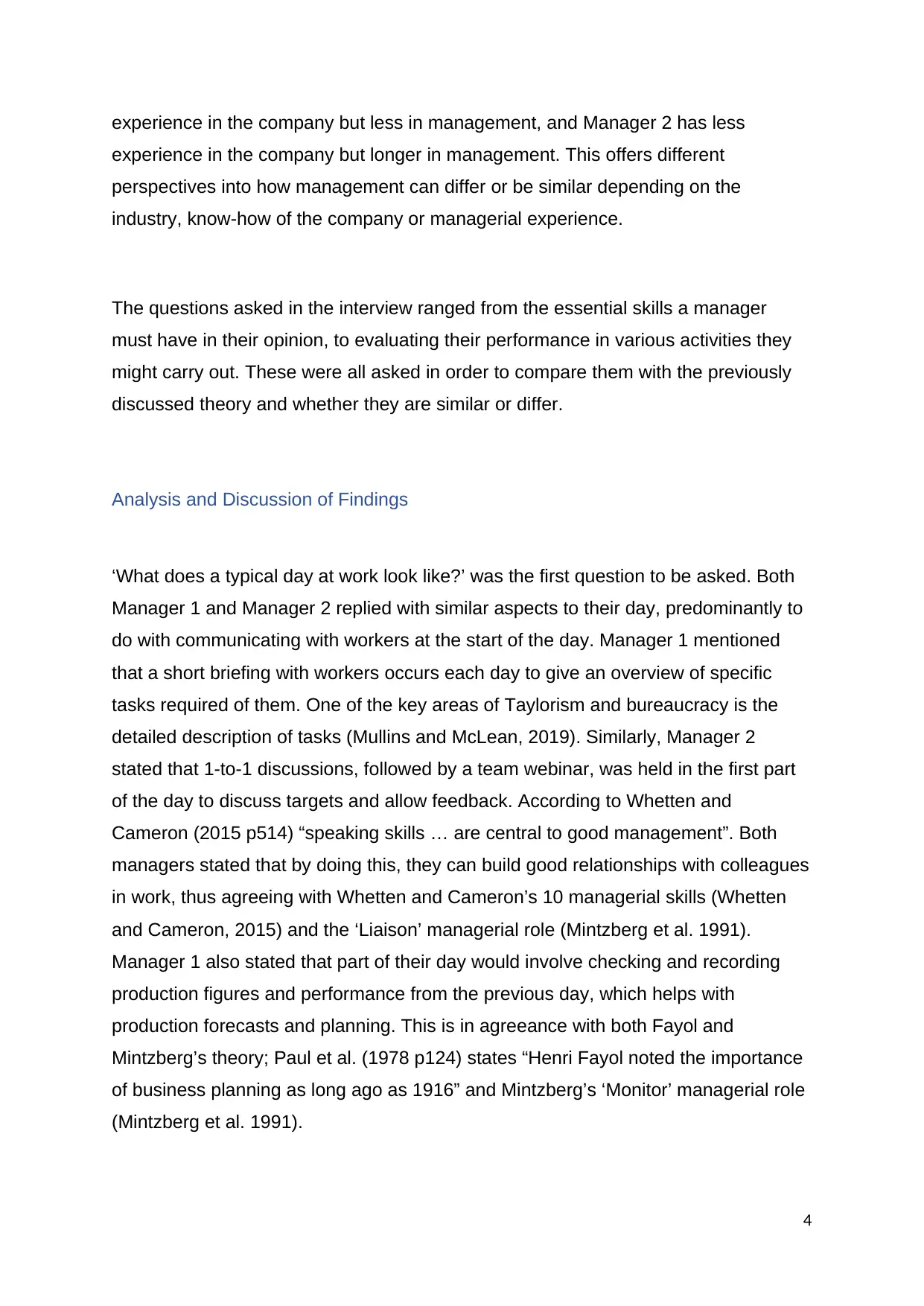
experience in the company but less in management, and Manager 2 has less
experience in the company but longer in management. This offers different
perspectives into how management can differ or be similar depending on the
industry, know-how of the company or managerial experience.
The questions asked in the interview ranged from the essential skills a manager
must have in their opinion, to evaluating their performance in various activities they
might carry out. These were all asked in order to compare them with the previously
discussed theory and whether they are similar or differ.
Analysis and Discussion of Findings
‘What does a typical day at work look like?’ was the first question to be asked. Both
Manager 1 and Manager 2 replied with similar aspects to their day, predominantly to
do with communicating with workers at the start of the day. Manager 1 mentioned
that a short briefing with workers occurs each day to give an overview of specific
tasks required of them. One of the key areas of Taylorism and bureaucracy is the
detailed description of tasks (Mullins and McLean, 2019). Similarly, Manager 2
stated that 1-to-1 discussions, followed by a team webinar, was held in the first part
of the day to discuss targets and allow feedback. According to Whetten and
Cameron (2015 p514) “speaking skills … are central to good management”. Both
managers stated that by doing this, they can build good relationships with colleagues
in work, thus agreeing with Whetten and Cameron’s 10 managerial skills (Whetten
and Cameron, 2015) and the ‘Liaison’ managerial role (Mintzberg et al. 1991).
Manager 1 also stated that part of their day would involve checking and recording
production figures and performance from the previous day, which helps with
production forecasts and planning. This is in agreeance with both Fayol and
Mintzberg’s theory; Paul et al. (1978 p124) states “Henri Fayol noted the importance
of business planning as long ago as 1916” and Mintzberg’s ‘Monitor’ managerial role
(Mintzberg et al. 1991).
4
experience in the company but longer in management. This offers different
perspectives into how management can differ or be similar depending on the
industry, know-how of the company or managerial experience.
The questions asked in the interview ranged from the essential skills a manager
must have in their opinion, to evaluating their performance in various activities they
might carry out. These were all asked in order to compare them with the previously
discussed theory and whether they are similar or differ.
Analysis and Discussion of Findings
‘What does a typical day at work look like?’ was the first question to be asked. Both
Manager 1 and Manager 2 replied with similar aspects to their day, predominantly to
do with communicating with workers at the start of the day. Manager 1 mentioned
that a short briefing with workers occurs each day to give an overview of specific
tasks required of them. One of the key areas of Taylorism and bureaucracy is the
detailed description of tasks (Mullins and McLean, 2019). Similarly, Manager 2
stated that 1-to-1 discussions, followed by a team webinar, was held in the first part
of the day to discuss targets and allow feedback. According to Whetten and
Cameron (2015 p514) “speaking skills … are central to good management”. Both
managers stated that by doing this, they can build good relationships with colleagues
in work, thus agreeing with Whetten and Cameron’s 10 managerial skills (Whetten
and Cameron, 2015) and the ‘Liaison’ managerial role (Mintzberg et al. 1991).
Manager 1 also stated that part of their day would involve checking and recording
production figures and performance from the previous day, which helps with
production forecasts and planning. This is in agreeance with both Fayol and
Mintzberg’s theory; Paul et al. (1978 p124) states “Henri Fayol noted the importance
of business planning as long ago as 1916” and Mintzberg’s ‘Monitor’ managerial role
(Mintzberg et al. 1991).
4
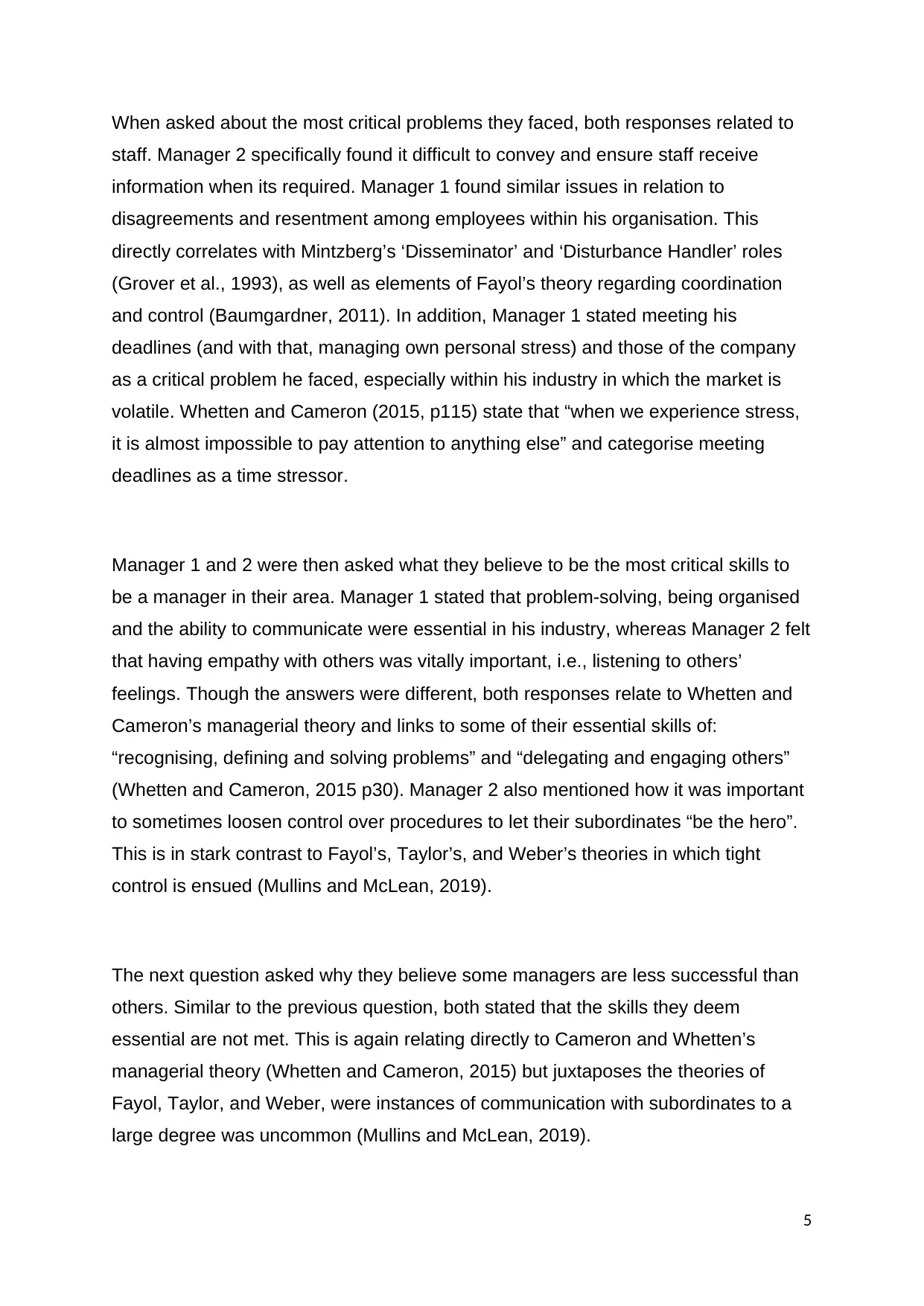
When asked about the most critical problems they faced, both responses related to
staff. Manager 2 specifically found it difficult to convey and ensure staff receive
information when its required. Manager 1 found similar issues in relation to
disagreements and resentment among employees within his organisation. This
directly correlates with Mintzberg’s ‘Disseminator’ and ‘Disturbance Handler’ roles
(Grover et al., 1993), as well as elements of Fayol’s theory regarding coordination
and control (Baumgardner, 2011). In addition, Manager 1 stated meeting his
deadlines (and with that, managing own personal stress) and those of the company
as a critical problem he faced, especially within his industry in which the market is
volatile. Whetten and Cameron (2015, p115) state that “when we experience stress,
it is almost impossible to pay attention to anything else” and categorise meeting
deadlines as a time stressor.
Manager 1 and 2 were then asked what they believe to be the most critical skills to
be a manager in their area. Manager 1 stated that problem-solving, being organised
and the ability to communicate were essential in his industry, whereas Manager 2 felt
that having empathy with others was vitally important, i.e., listening to others’
feelings. Though the answers were different, both responses relate to Whetten and
Cameron’s managerial theory and links to some of their essential skills of:
“recognising, defining and solving problems” and “delegating and engaging others”
(Whetten and Cameron, 2015 p30). Manager 2 also mentioned how it was important
to sometimes loosen control over procedures to let their subordinates “be the hero”.
This is in stark contrast to Fayol’s, Taylor’s, and Weber’s theories in which tight
control is ensued (Mullins and McLean, 2019).
The next question asked why they believe some managers are less successful than
others. Similar to the previous question, both stated that the skills they deem
essential are not met. This is again relating directly to Cameron and Whetten’s
managerial theory (Whetten and Cameron, 2015) but juxtaposes the theories of
Fayol, Taylor, and Weber, were instances of communication with subordinates to a
large degree was uncommon (Mullins and McLean, 2019).
5
staff. Manager 2 specifically found it difficult to convey and ensure staff receive
information when its required. Manager 1 found similar issues in relation to
disagreements and resentment among employees within his organisation. This
directly correlates with Mintzberg’s ‘Disseminator’ and ‘Disturbance Handler’ roles
(Grover et al., 1993), as well as elements of Fayol’s theory regarding coordination
and control (Baumgardner, 2011). In addition, Manager 1 stated meeting his
deadlines (and with that, managing own personal stress) and those of the company
as a critical problem he faced, especially within his industry in which the market is
volatile. Whetten and Cameron (2015, p115) state that “when we experience stress,
it is almost impossible to pay attention to anything else” and categorise meeting
deadlines as a time stressor.
Manager 1 and 2 were then asked what they believe to be the most critical skills to
be a manager in their area. Manager 1 stated that problem-solving, being organised
and the ability to communicate were essential in his industry, whereas Manager 2 felt
that having empathy with others was vitally important, i.e., listening to others’
feelings. Though the answers were different, both responses relate to Whetten and
Cameron’s managerial theory and links to some of their essential skills of:
“recognising, defining and solving problems” and “delegating and engaging others”
(Whetten and Cameron, 2015 p30). Manager 2 also mentioned how it was important
to sometimes loosen control over procedures to let their subordinates “be the hero”.
This is in stark contrast to Fayol’s, Taylor’s, and Weber’s theories in which tight
control is ensued (Mullins and McLean, 2019).
The next question asked why they believe some managers are less successful than
others. Similar to the previous question, both stated that the skills they deem
essential are not met. This is again relating directly to Cameron and Whetten’s
managerial theory (Whetten and Cameron, 2015) but juxtaposes the theories of
Fayol, Taylor, and Weber, were instances of communication with subordinates to a
large degree was uncommon (Mullins and McLean, 2019).
5
⊘ This is a preview!⊘
Do you want full access?
Subscribe today to unlock all pages.

Trusted by 1+ million students worldwide
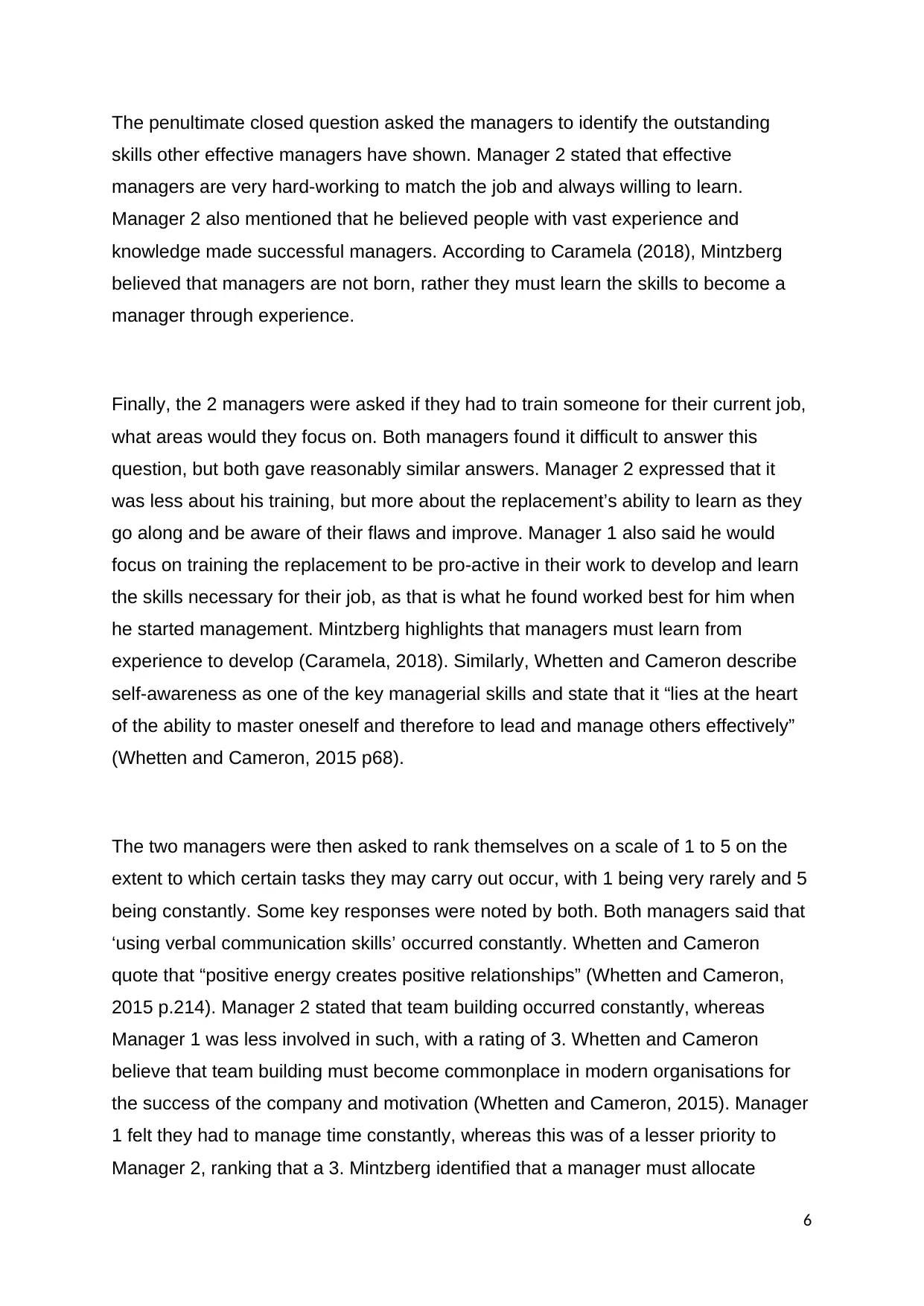
The penultimate closed question asked the managers to identify the outstanding
skills other effective managers have shown. Manager 2 stated that effective
managers are very hard-working to match the job and always willing to learn.
Manager 2 also mentioned that he believed people with vast experience and
knowledge made successful managers. According to Caramela (2018), Mintzberg
believed that managers are not born, rather they must learn the skills to become a
manager through experience.
Finally, the 2 managers were asked if they had to train someone for their current job,
what areas would they focus on. Both managers found it difficult to answer this
question, but both gave reasonably similar answers. Manager 2 expressed that it
was less about his training, but more about the replacement’s ability to learn as they
go along and be aware of their flaws and improve. Manager 1 also said he would
focus on training the replacement to be pro-active in their work to develop and learn
the skills necessary for their job, as that is what he found worked best for him when
he started management. Mintzberg highlights that managers must learn from
experience to develop (Caramela, 2018). Similarly, Whetten and Cameron describe
self-awareness as one of the key managerial skills and state that it “lies at the heart
of the ability to master oneself and therefore to lead and manage others effectively”
(Whetten and Cameron, 2015 p68).
The two managers were then asked to rank themselves on a scale of 1 to 5 on the
extent to which certain tasks they may carry out occur, with 1 being very rarely and 5
being constantly. Some key responses were noted by both. Both managers said that
‘using verbal communication skills’ occurred constantly. Whetten and Cameron
quote that “positive energy creates positive relationships” (Whetten and Cameron,
2015 p.214). Manager 2 stated that team building occurred constantly, whereas
Manager 1 was less involved in such, with a rating of 3. Whetten and Cameron
believe that team building must become commonplace in modern organisations for
the success of the company and motivation (Whetten and Cameron, 2015). Manager
1 felt they had to manage time constantly, whereas this was of a lesser priority to
Manager 2, ranking that a 3. Mintzberg identified that a manager must allocate
6
skills other effective managers have shown. Manager 2 stated that effective
managers are very hard-working to match the job and always willing to learn.
Manager 2 also mentioned that he believed people with vast experience and
knowledge made successful managers. According to Caramela (2018), Mintzberg
believed that managers are not born, rather they must learn the skills to become a
manager through experience.
Finally, the 2 managers were asked if they had to train someone for their current job,
what areas would they focus on. Both managers found it difficult to answer this
question, but both gave reasonably similar answers. Manager 2 expressed that it
was less about his training, but more about the replacement’s ability to learn as they
go along and be aware of their flaws and improve. Manager 1 also said he would
focus on training the replacement to be pro-active in their work to develop and learn
the skills necessary for their job, as that is what he found worked best for him when
he started management. Mintzberg highlights that managers must learn from
experience to develop (Caramela, 2018). Similarly, Whetten and Cameron describe
self-awareness as one of the key managerial skills and state that it “lies at the heart
of the ability to master oneself and therefore to lead and manage others effectively”
(Whetten and Cameron, 2015 p68).
The two managers were then asked to rank themselves on a scale of 1 to 5 on the
extent to which certain tasks they may carry out occur, with 1 being very rarely and 5
being constantly. Some key responses were noted by both. Both managers said that
‘using verbal communication skills’ occurred constantly. Whetten and Cameron
quote that “positive energy creates positive relationships” (Whetten and Cameron,
2015 p.214). Manager 2 stated that team building occurred constantly, whereas
Manager 1 was less involved in such, with a rating of 3. Whetten and Cameron
believe that team building must become commonplace in modern organisations for
the success of the company and motivation (Whetten and Cameron, 2015). Manager
1 felt they had to manage time constantly, whereas this was of a lesser priority to
Manager 2, ranking that a 3. Mintzberg identified that a manager must allocate
6
Paraphrase This Document
Need a fresh take? Get an instant paraphrase of this document with our AI Paraphraser
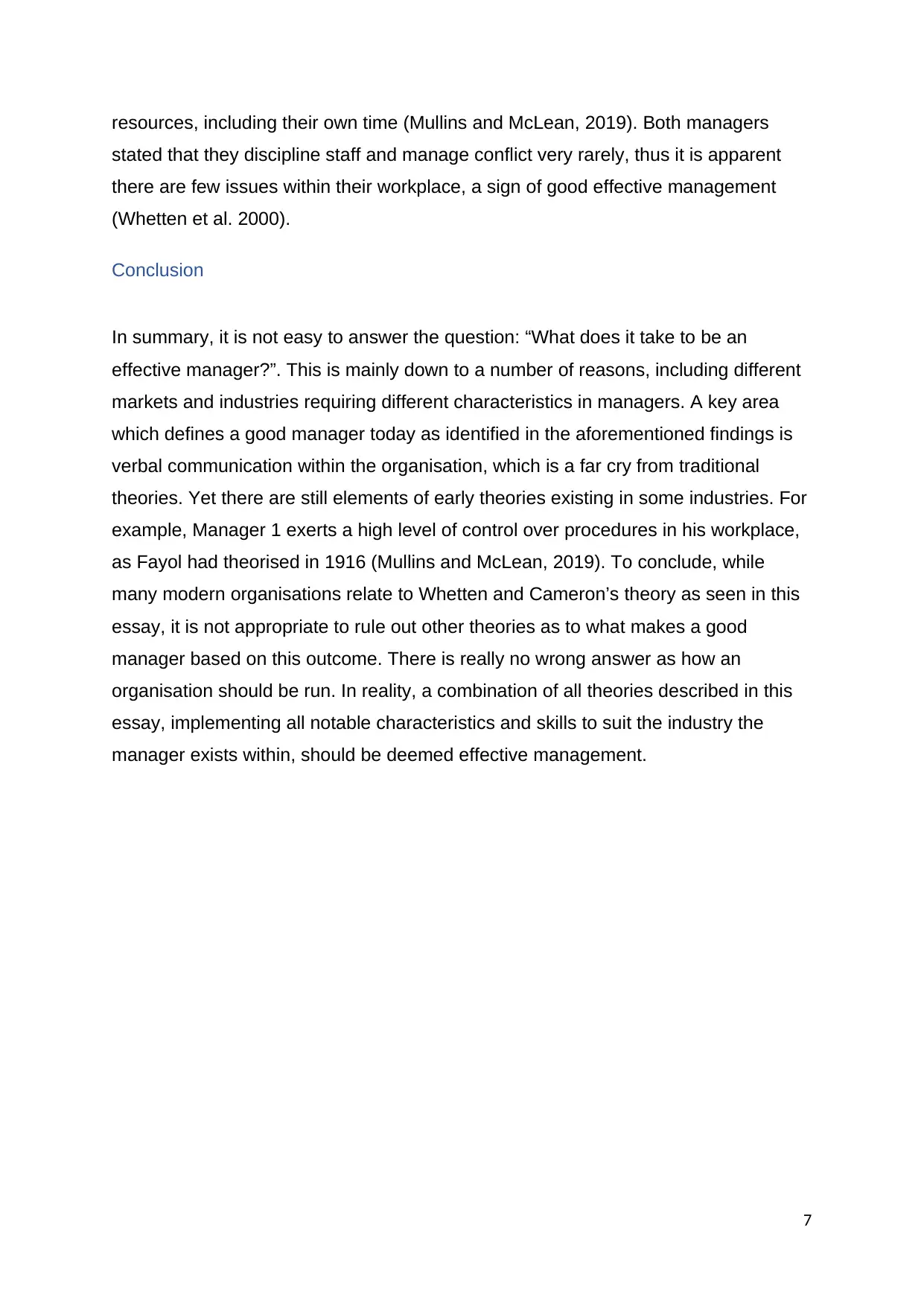
resources, including their own time (Mullins and McLean, 2019). Both managers
stated that they discipline staff and manage conflict very rarely, thus it is apparent
there are few issues within their workplace, a sign of good effective management
(Whetten et al. 2000).
Conclusion
In summary, it is not easy to answer the question: “What does it take to be an
effective manager?”. This is mainly down to a number of reasons, including different
markets and industries requiring different characteristics in managers. A key area
which defines a good manager today as identified in the aforementioned findings is
verbal communication within the organisation, which is a far cry from traditional
theories. Yet there are still elements of early theories existing in some industries. For
example, Manager 1 exerts a high level of control over procedures in his workplace,
as Fayol had theorised in 1916 (Mullins and McLean, 2019). To conclude, while
many modern organisations relate to Whetten and Cameron’s theory as seen in this
essay, it is not appropriate to rule out other theories as to what makes a good
manager based on this outcome. There is really no wrong answer as how an
organisation should be run. In reality, a combination of all theories described in this
essay, implementing all notable characteristics and skills to suit the industry the
manager exists within, should be deemed effective management.
7
stated that they discipline staff and manage conflict very rarely, thus it is apparent
there are few issues within their workplace, a sign of good effective management
(Whetten et al. 2000).
Conclusion
In summary, it is not easy to answer the question: “What does it take to be an
effective manager?”. This is mainly down to a number of reasons, including different
markets and industries requiring different characteristics in managers. A key area
which defines a good manager today as identified in the aforementioned findings is
verbal communication within the organisation, which is a far cry from traditional
theories. Yet there are still elements of early theories existing in some industries. For
example, Manager 1 exerts a high level of control over procedures in his workplace,
as Fayol had theorised in 1916 (Mullins and McLean, 2019). To conclude, while
many modern organisations relate to Whetten and Cameron’s theory as seen in this
essay, it is not appropriate to rule out other theories as to what makes a good
manager based on this outcome. There is really no wrong answer as how an
organisation should be run. In reality, a combination of all theories described in this
essay, implementing all notable characteristics and skills to suit the industry the
manager exists within, should be deemed effective management.
7
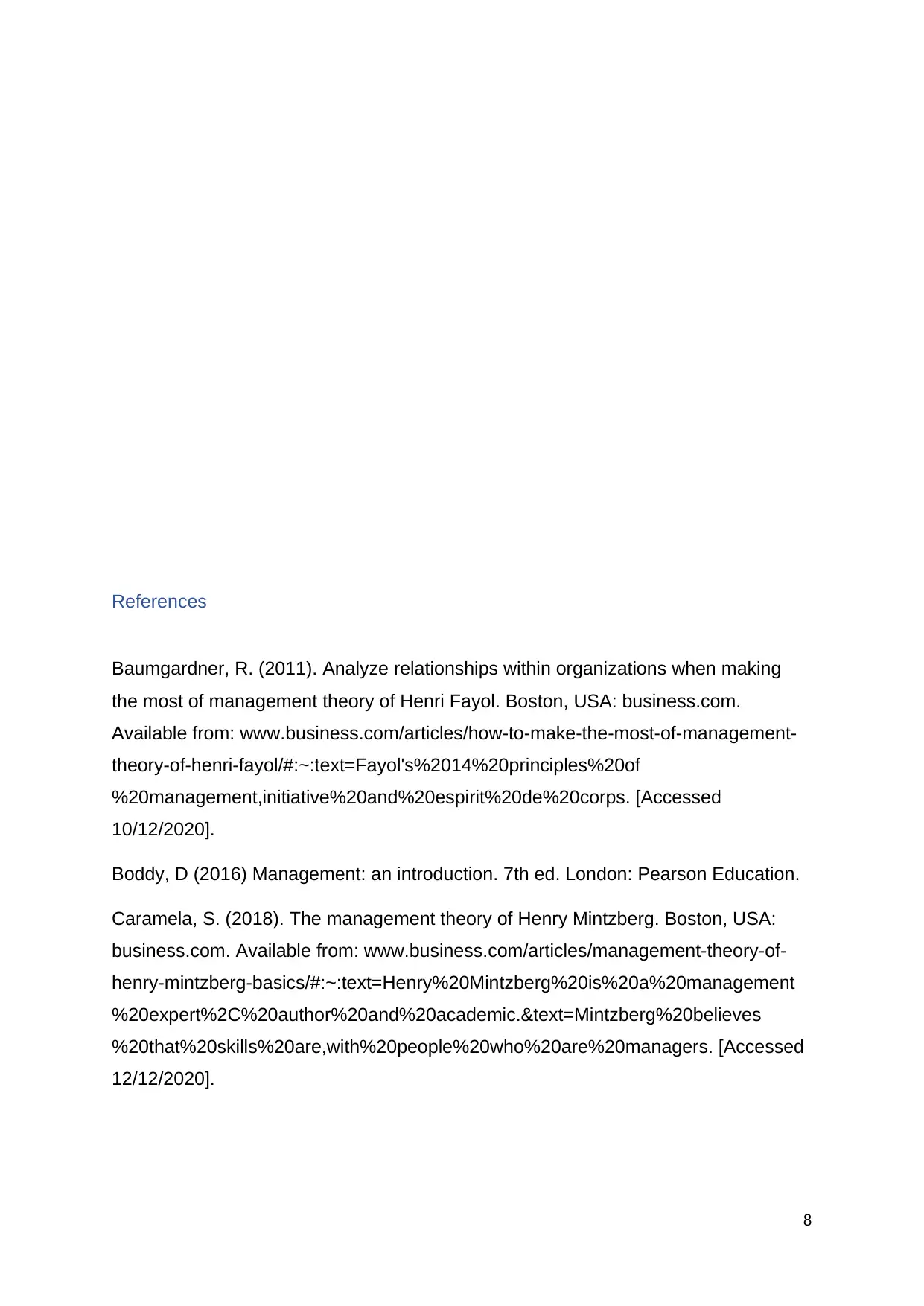
References
Baumgardner, R. (2011). Analyze relationships within organizations when making
the most of management theory of Henri Fayol. Boston, USA: business.com.
Available from: www.business.com/articles/how-to-make-the-most-of-management-
theory-of-henri-fayol/#:~:text=Fayol's%2014%20principles%20of
%20management,initiative%20and%20espirit%20de%20corps. [Accessed
10/12/2020].
Boddy, D (2016) Management: an introduction. 7th ed. London: Pearson Education.
Caramela, S. (2018). The management theory of Henry Mintzberg. Boston, USA:
business.com. Available from: www.business.com/articles/management-theory-of-
henry-mintzberg-basics/#:~:text=Henry%20Mintzberg%20is%20a%20management
%20expert%2C%20author%20and%20academic.&text=Mintzberg%20believes
%20that%20skills%20are,with%20people%20who%20are%20managers. [Accessed
12/12/2020].
8
Baumgardner, R. (2011). Analyze relationships within organizations when making
the most of management theory of Henri Fayol. Boston, USA: business.com.
Available from: www.business.com/articles/how-to-make-the-most-of-management-
theory-of-henri-fayol/#:~:text=Fayol's%2014%20principles%20of
%20management,initiative%20and%20espirit%20de%20corps. [Accessed
10/12/2020].
Boddy, D (2016) Management: an introduction. 7th ed. London: Pearson Education.
Caramela, S. (2018). The management theory of Henry Mintzberg. Boston, USA:
business.com. Available from: www.business.com/articles/management-theory-of-
henry-mintzberg-basics/#:~:text=Henry%20Mintzberg%20is%20a%20management
%20expert%2C%20author%20and%20academic.&text=Mintzberg%20believes
%20that%20skills%20are,with%20people%20who%20are%20managers. [Accessed
12/12/2020].
8
⊘ This is a preview!⊘
Do you want full access?
Subscribe today to unlock all pages.

Trusted by 1+ million students worldwide
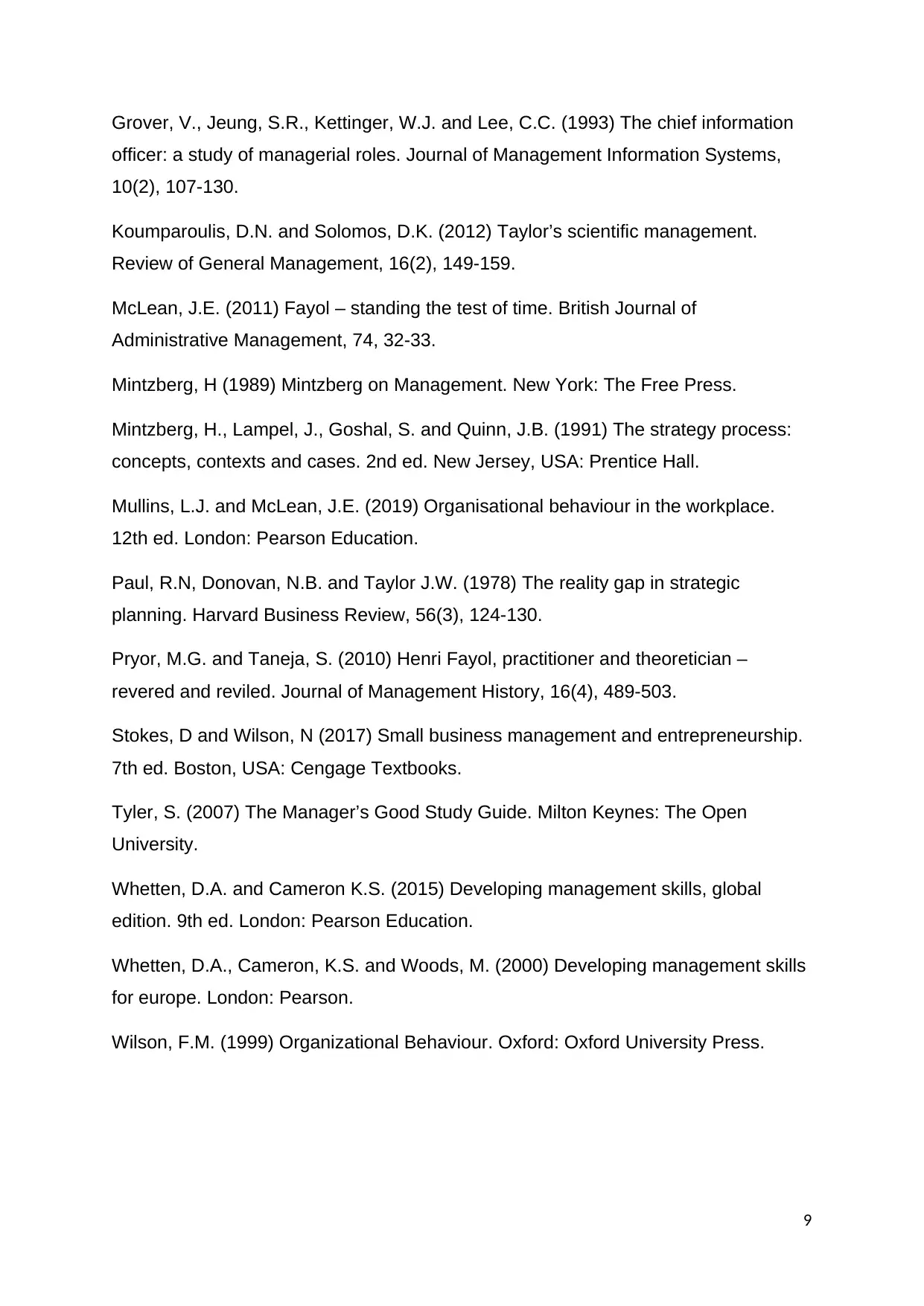
Grover, V., Jeung, S.R., Kettinger, W.J. and Lee, C.C. (1993) The chief information
officer: a study of managerial roles. Journal of Management Information Systems,
10(2), 107-130.
Koumparoulis, D.N. and Solomos, D.K. (2012) Taylor’s scientific management.
Review of General Management, 16(2), 149-159.
McLean, J.E. (2011) Fayol – standing the test of time. British Journal of
Administrative Management, 74, 32-33.
Mintzberg, H (1989) Mintzberg on Management. New York: The Free Press.
Mintzberg, H., Lampel, J., Goshal, S. and Quinn, J.B. (1991) The strategy process:
concepts, contexts and cases. 2nd ed. New Jersey, USA: Prentice Hall.
Mullins, L.J. and McLean, J.E. (2019) Organisational behaviour in the workplace.
12th ed. London: Pearson Education.
Paul, R.N, Donovan, N.B. and Taylor J.W. (1978) The reality gap in strategic
planning. Harvard Business Review, 56(3), 124-130.
Pryor, M.G. and Taneja, S. (2010) Henri Fayol, practitioner and theoretician –
revered and reviled. Journal of Management History, 16(4), 489-503.
Stokes, D and Wilson, N (2017) Small business management and entrepreneurship.
7th ed. Boston, USA: Cengage Textbooks.
Tyler, S. (2007) The Manager’s Good Study Guide. Milton Keynes: The Open
University.
Whetten, D.A. and Cameron K.S. (2015) Developing management skills, global
edition. 9th ed. London: Pearson Education.
Whetten, D.A., Cameron, K.S. and Woods, M. (2000) Developing management skills
for europe. London: Pearson.
Wilson, F.M. (1999) Organizational Behaviour. Oxford: Oxford University Press.
9
officer: a study of managerial roles. Journal of Management Information Systems,
10(2), 107-130.
Koumparoulis, D.N. and Solomos, D.K. (2012) Taylor’s scientific management.
Review of General Management, 16(2), 149-159.
McLean, J.E. (2011) Fayol – standing the test of time. British Journal of
Administrative Management, 74, 32-33.
Mintzberg, H (1989) Mintzberg on Management. New York: The Free Press.
Mintzberg, H., Lampel, J., Goshal, S. and Quinn, J.B. (1991) The strategy process:
concepts, contexts and cases. 2nd ed. New Jersey, USA: Prentice Hall.
Mullins, L.J. and McLean, J.E. (2019) Organisational behaviour in the workplace.
12th ed. London: Pearson Education.
Paul, R.N, Donovan, N.B. and Taylor J.W. (1978) The reality gap in strategic
planning. Harvard Business Review, 56(3), 124-130.
Pryor, M.G. and Taneja, S. (2010) Henri Fayol, practitioner and theoretician –
revered and reviled. Journal of Management History, 16(4), 489-503.
Stokes, D and Wilson, N (2017) Small business management and entrepreneurship.
7th ed. Boston, USA: Cengage Textbooks.
Tyler, S. (2007) The Manager’s Good Study Guide. Milton Keynes: The Open
University.
Whetten, D.A. and Cameron K.S. (2015) Developing management skills, global
edition. 9th ed. London: Pearson Education.
Whetten, D.A., Cameron, K.S. and Woods, M. (2000) Developing management skills
for europe. London: Pearson.
Wilson, F.M. (1999) Organizational Behaviour. Oxford: Oxford University Press.
9
Paraphrase This Document
Need a fresh take? Get an instant paraphrase of this document with our AI Paraphraser

10
1 out of 11
Related Documents
Your All-in-One AI-Powered Toolkit for Academic Success.
+13062052269
info@desklib.com
Available 24*7 on WhatsApp / Email
![[object Object]](/_next/static/media/star-bottom.7253800d.svg)
Unlock your academic potential
Copyright © 2020–2026 A2Z Services. All Rights Reserved. Developed and managed by ZUCOL.





